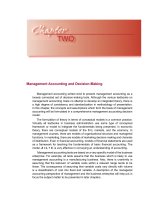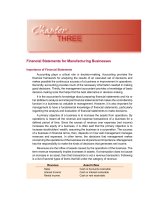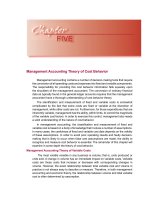Nen Tang Cua Ke Toan Quan Tri Chaper 1
Bạn đang xem bản rút gọn của tài liệu. Xem và tải ngay bản đầy đủ của tài liệu tại đây (600.47 KB, 16 trang )
Part I
Foundations of
Management Accounting
Chapter
1
•
Introduction to Management Accounting
Chapter
2
•
Management Accounting and Decision-making
Chapter
3
•
Financial Statements for Manufacturing Businesses
Chapter
4
•
Classication of Manufacturing Costs and Expenses
Chapter
5
•
Management Accounting Theory of Cost Behavior
Chapter
6
•
Direct Costing Financial Statements
Management Accounting
| 1
Introduction to Management Accounting
Introduction
Managerial accounting may be regarded as a body of knowledge that is
concerned with concepts and decision-making tools that enable management to
make better decisions and to evaluate results. As a body of technical knowledge,
management accounting primarily consists of certain decision-making techniques or
tools drawn from nancial and management theory and practice. A basic premise is
that the primary task of management is to make decisions and that this task is greatly
improved by the knowledge and skills of the management accountant. A corollary
premise is that the management accountant’s ability to serve management is greatly
enhanced by a knowledge of management and, in particular, a sound knowledge of
the fundamentals of marketing, production, and nance.
This book is based on the assumption that the accountant in the role of advisor
to management must understand basic management concepts, particularly those
concepts embedded in the function of decision-making. Only if the accountant has
a proper understanding of management’s needs will he or she be able to furnish
the data and special analyzes that will enable management to make consistently
good decisions. Conversely, this book assumes that management must understand
accounting and the type of information that the accountant can provide. Without
an understanding of some accounting, the manager or decision-maker may fail to
request information or seek help at a critical time. Therefore, this book is written for
two groups of individuals: accountants and managers. The accountants, of course,
are expected to acquire a higher degree of prociency in the use of the planning and
control techniques presented.
2 |
CHAPTER ONE
•
Introduction to Management Accounting
Denition of Management Accounting
What is accounting? A very old but frequently used denition states: “Accounting is
the art of recording, classifying, and summarizing in a signicant manner and in terms
of money, transactions, and events, which are, in part at least of a nancial character,
and interpreting the results thereof.” (AIA Bulletin No. 1 - Review and Resume)
A more recent denition states: “Accounting is a service activity. Its function is to
provide quantitative information, primarily nancial in nature, about economic entities
that is intended to be useful in making economic decisions–in making reasoned
choices among alternative courses of action.” (APB Statement No. 4) This latter
denition is more appropriate to managerial accounting because of its emphasis on
decision-making.
Management accounting may be simply dened as a body of accounting knowledge
primarily consisting of concepts and techniques (tools) useful to management in
making better decisions and evaluating performance. Most managerial accounting
theorists and writers agree that the following concepts and tools represent the
foundation of management accounting:
Decision-making Tools Concepts
1. Cost-volume-prot analysis 1. Fixed and variable costs
2. Comprehensive budgeting 2. Escapable and inescapable costs
3. Flexible budgeting 3. Relevant costs
4. Incremental analysis 4. Incremental costs
5. Return on investment 5. Sunk costs
6. Direct costing 6. Opportunity costs
7. Capital budgeting 7. Common costs
8. Inventory models 8. Direct and indirect cost
9. Cost analysis for marketing 9. Contribution margin
production, and nance 10. Planning
10. Segmental income statements 11. Control
11. Financial statement ratio analysis 12. Standards
13. Organization
From the above listing, it is apparent that the subject matter of management
accounting has little to do with transactions analysis and the preparation of statements
from historical data. However, management accounting is not independent of nancial
accounting. Financial accounting is a foundation requirement for management
accounting and a study of nancial accounting must precede the study of management
accounting. The basic carryover from the study of nancial accounting is a solid
understanding of nancial statements. An understanding of how to analyze and
record the effects of individual transactions of assets, liabilities, capital, and revenue
is helpful but not essential.
Management: The Focal Point of Management Accounting
The term management accounting obviously consists of two words each of which
represents highly developed areas of study. The term management accounting
suggests an important relationship between management and accounting.
Management Accounting
| 3
Furthermore, there is implied an area of common interests. Management accounting
is not merely the application of accounting to management; rather it is a study of
analytical techniques that result from the combining of accounting fundamentals with
the fundamental concepts of management.
The student that is planning a professional career in accounting must develop
an appreciation and understanding of management. It is management that guides
the business and makes the decisions which determine the success or failure of a
business. The accountant serves in a staff or advisory function under management.
On the other hand, those students planning a professional career as managers
need to understand and appreciate that a knowledge of accounting is critically
important. Although accountants use technical accounting expertise to prepare
nancial statements, it is management that receives and uses nancial statements.
Management, not accountants, has the need and responsibility to read and understand
nancial statements. Financial statements, in one sense, are summary reports of
how well management has performed (made decisions) for a given period of time.
For management to have a negative attitude towards accounting is tantamount to
being negative towards their own responsibilities and accomplishments.
Certain concepts of management are essential to a study of management
accounting. The following concepts will be employed throughout this text as important
in understanding the technical aspects of management accounting.
Planning
Control (performance evaluation)
Organization
Standards
Decision-making
Feedback
Goals and objective
Strategy
These terms will be explained in the chapters where they can be logically
associated to the management accounting tools that make them relevant.
Accounting as an Organizational Function
Management accounting techniques are useful in all types of businesses.
Managers of service, merchandising, manufacturing, banks, insurance companies,
etc. all can benet from the use of management accounting. Management accounting
is frequently associated with fairly large corporate businesses; however, it is equally
useful to small businesses.
When a business reaches a certain size, then the accounting activity is of such a
volume that the accounting activity must be organized and managed. Consequently,
accounting in larger businesses can be thought of as a departmentalized function
appearing on the organization chart as a staff function. While the term management
accounting implies to individuals possessing specialized knowledge of management
and accounting, the term can also be applied to the accounting department as a whole.
A simple model of the accounting function is shown in Figure 1.1. The management
techniques presented in this book would primarily be used in the budgeting and
revenue and cost analysis section of the accounting department.
4 |
CHAPTER ONE
•
Introduction to Management Accounting
President
Board of
Directors
Marketing
Department
Production
Department
Finance
Department
Accounting
Department
From a departmental viewpoint, all accounting activities are management in nature.
The accounting department exists to serve the nancial data needs of management.
The controller or head of the accounting department in many companies is considered
to be a part of the decision-making team. Therefore, from an organizational viewpoint,
the distinction between nancial accounting and managerial accounting is somewhat
articial. The controller, the chief executive ofcer of the accounting department, is
always serving as an management accountant, regardless of what type of accounting
is being done. However, the majority of accounting activities he or she supervises
would from an academic viewpoint be classied as nancial accounting as opposed
to management accounting.
Relationship of Financial and Managerial Accounting
The study of accounting is normally divided into two broad categories: nancial
and managerial. This division is somewhat arbitrary in that the study of managerial
accounting requires a strong foundation in nancial accounting. However, there is a
denite difference in orientation and methodology which needs to be understood.
Accounting exists in a network of complex business relationships both internal
and external. In management accounting, the focal point is the role of management
within the organizational structure. Both the nancial accountant and the managerial
accountant need a knowledge of external factors and relationships as well as a
conceptual knowledge of accounting principles and procedures. Accounting as a
function within a business organization is service oriented. Accounting serves the
nancial information needs of many different types of groups including investors,
governments, customers, employees, unions, and bankers. Most importantly, it serves
the internal information needs of management. Figure 1.2 illustrates the environment
in which management and the management accountant operate.
FIGURE 1.1 • Diagram of the Accounting Function









